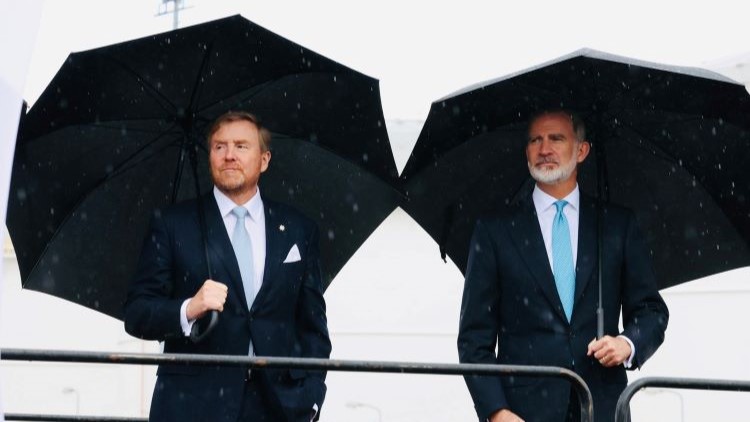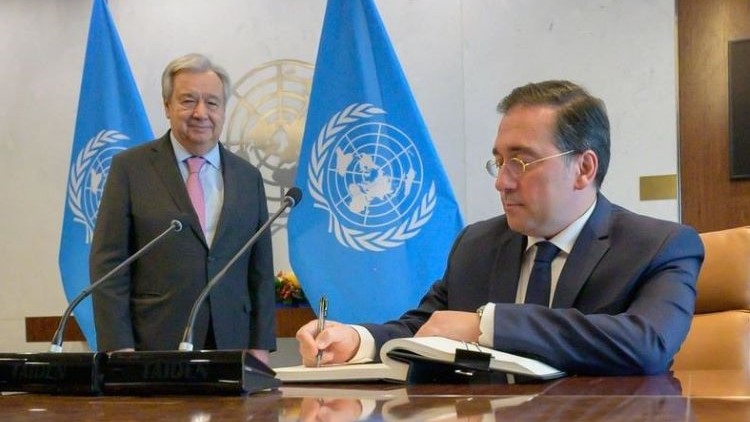Eduardo González
Felipe VI discussed yesterday with representatives of Dutch and Spanish companies the development of the hydrogen maritime corridor between the ports of Bilbao and Amsterdam, on the occasion of the State visit of the King and Queen to the Netherlands, the first of 2024, which began on Tuesday and will conclude today.
Don Felipe and Doña Letizia travel accompanied by the Minister of Foreign Affairs, José Manuel Albares; the Secretary of State for Commerce, Xiana Méndez; the president of the Spanish Chamber of Commerce, José Luis Bonet; and the president of the Spanish Confederation of Business Organizations (CEOE), Antonio Garamendi. The last state trip to the Netherlands dates back to 2001. In addition, Spain received the State Visit of Queen Beatrix in 1985.
The trip agenda began on Tuesday in Amsterdam with a reception for the Spanish community residing in the Netherlands, before whom he spoke a few words in which he thanked the Spanish community for its contribution “to the ‘Brand Spain’, to spreading a human imprint, social and cultural of our country of which we are very proud, for the image of professionalism, efficiency and modernity that you project in the Netherlands.”
The number of Spaniards residing in the Netherlands has increased considerably in recent years: from 28,694 in 2018 to more than 37,000 registered in the Consular Registration Registry at present, although there could be a total of close to 50,000, and it seems that the trend is that continues to increase. Spain is the seventh country in the European Union with the highest number of workers in the Netherlands, where in 2022 they represented 3.83% of the total number of workers in the European Union in this country.
Official reception
Early yesterday, Don Felipe and Doña Letizia traveled to the Royal Palace of Amsterdam to attend the Official Reception by the King and Queen of the Netherlands. After the welcome ceremony, the King and Queen walked to the Dam Square National Monument, where a floral offering was made. Every year, on May 4, the National Commemoration is celebrated in this square, in front of the Palace, in honor of the Dutch victims of the Second World War.
After a lunch offered by the King and Queen of the Netherlands, Don Felipe and King William moved to the Ajax Betendorp Sports Complex of the Cruyff Foundation, in the Amsterdam neighborhood, where the Dutch player was born and the Club’s first major stadium was located. of Ajax Football. The Cruyff Foundation supports and develops sports projects for children in need, around the world. In Spain they have projects in Catalonia, La Rioja, Aragon, Cantabria, the Basque Country, Castilla y León, the Balearic Islands and Madrid.
Felipe and King William subsequently visited the port of Amsterdam and the EVOS and Sunoco terminals, which feature prominently in the country’s hydrogen import ambitions, and spoke with representatives of Dutch and Spanish companies about the development of a maritime corridor of hydrogen between the ports of Bilbao and Amsterdam.
Both ports signed their collaboration agreement during the work trip made by King William Alexander to Spain in June 2023, during which he visited the Puertollano (Iberdrola) and Algeciras (Cepsa) facilities.
The Bilbao-Amsterdam corridor is explicitly situated in the context of the European Union’s ambitions to create intra-European corridors for the export and import of hydrogen, contributing to energy security and taking advantage of the related economic benefits. The planned hydrogen corridor essentially consists of three logistics routes, one for the transport of hydrogen, one for the transport of hydrogen in liquid form and another for the transport of hydrogen-derived fuels.
Gala dinner
The day concluded with a gala dinner offered by William and Máxima in honor of the Kings at the Royal Palace of Amsterdam, which was also attended by Princess Catherine Amalia of Orange, Princess Beatrice and Princess Margaret and her husband, Pieter Van Vollenhoven.
The presence of Princess Amalia, who studied last year in Madrid after receiving threats from organized crime groups in her country, was expressly mentioned by King William in his speech. “Last year, circumstances forced him to live for a while in Madrid and, from there, he was able to continue his studies at the University of Amsterdam,” which “was possible thanks to the kind efforts of many of his compatriots and you. themselves” and represented “a moving demonstration of friendship in a difficult time.”
Likewise, the Dutch monarch recalled that, during his last meeting with Felipe VI in Spain, last June, both spoke “extensively about the opportunities that green hydrogen can offer in the transition towards a European sustainable energy system.” “Our countries together are developing a green corridor,” he said. “Someday, ‘the Spanish sun’ will also warm the cold north and help make our industry greener,” he added.
For his part, Felipe VI stated in his speech that Spain and the Netherlands are “fundamental” to guarantee a “stronger, more autonomous democracy and a greener and more efficient Europe” and represent two of the “most dynamic” economies in the EU. “By working together, we will pave the way for the energy and digital transitions that the Union is undergoing,” he continued. Likewise, he highlighted that “prosperity and peace rest on the firm foundation provided by our membership in the EU and NATO, requiring that we remain united and firm in our principles and values, together with our allies” and expressed his desire to that this state visit strengthens the bilateral relationship between both countries and is taken “to a broader level.”
José Manuel Albares and Hanke Bruins Slot
On the other hand, the Minister of Foreign Affairs, José Manuel Albares, took advantage of the State visit of the Kings to meet with his Dutch counterpart, Hanke Bruins Slot, with whom he reviewed the future Strategic Agenda of the European Union, with special emphasis on enlargement, the upcoming elections to the European Parliament and Open Strategic Autonomy, and discussed international issues, such as the situation in the Middle East, the war in Ukraine and the upcoming NATO summit in Washington.
The two ministers also signed joint statements on Feminist Foreign Policy, in which they committed to holding regular annual consultations to shape feminist foreign policies, and on European Strategic Cooperation, in which they called for strengthening the EU’s role as a geopolitical player, investing more in defense and expanding its voice on the world stage, and for building a competitive and open economy, strengthening the single market while stimulating international cooperation and sustainable development around the world.







